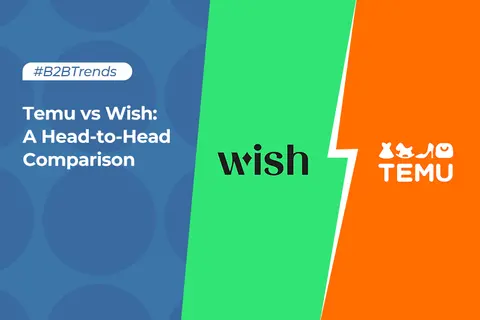Temu vs Wish: A Head-to-Head Comparison

Table of Contents
Are Wish And Temu The Same Company?
Temu and Wish are not the same company. Both of them are two prominent e-commerce platforms like Alibaba that have gained significant attention in the online shopping landscape. Wish, founded in the US in 2010, serves as a platform connecting global buyers with mainly Chinese sellers and operates under American ownership. In contrast, Temu, owned by PDD Holdings, a Chinese company, entered the US market in 2022 with a focus on providing a localized shopping experience by connecting buyers with local sellers. Despite similarities in offering a wide range of products at competitive prices, their distinct business models, user interfaces, and market presence differentiate them as separate entities in the online marketplace landscape.
What is Temu?
Temu is a rapidly emerging e-commerce platform that has garnered attention for its unique approach to connecting buyers with sellers. Owned by PDD Holdings, a prominent Chinese company, Temu entered the US market in 2022, aiming to carve out its niche in the competitive online marketplace landscape. Here's a deeper exploration of what Temu is all about, backed by relevant data and insights.
Origin and Ownership of Temu
Temu is owned by PDD Holdings, a Chinese conglomerate known for its diverse portfolio of businesses, including e-commerce ventures. Founded in China, PDD Holdings has established itself as a major player in the global e-commerce market, leveraging innovative strategies and technology to drive growth.
Business Model and Approach of Temu
Temu distinguishes itself by offering a localized shopping experience, connecting buyers with local sellers in specific regions. This approach sets it apart from traditional e-commerce platforms, which often prioritize global sellers and products. By focusing on local sellers, Temu aims to cater to the preferences and needs of regional markets, enhancing customer satisfaction and loyalty.
What is Wish?
Wish is a globally recognized e-commerce platform that has gained significant traction since its inception in 2010. Founded by former Google engineers, Wish quickly emerged as a disruptive force in the online retail space, offering a vast array of products at competitive prices. At its core, Wish operates as a digital marketplace connecting millions of buyers with sellers from around the world, predominantly from China.
Origin and Growth of Wish
Wish was founded in the United States, with its headquarters situated in San Francisco, California. Since its launch, the platform has experienced remarkable growth, fueled by its innovative business model and aggressive marketing strategies. By leveraging data-driven approaches and machine learning algorithms, Wish has successfully targeted and engaged a diverse global audience, spanning multiple demographics and geographic regions.
Market Presence and Reach of Wish
The impact of Wish on the global e-commerce landscape is undeniable. With a presence in over 100 countries and regions worldwide, Wish has cultivated a massive user base, comprising millions of active consumers. As of the latest available data, Wish boasts over 100 million monthly active users, underscoring its status as one of the world's leading online marketplaces.
Temu vs Wish: A Head to Head Comparison
1.Product Categories
Wish prides itself on offering a vast and eclectic array of products across numerous categories. From electronics and fashion to home goods and beauty products, Wish caters to a wide spectrum of consumer needs and preferences. In contrast, Temu adopts a more curated approach to its product categories, prioritizing quality over quantity. While Temu also covers a diverse range of product segments, including electronics, fashion, and home essentials, its selection tends to be more selective and focused.
2.Product Quality
Both of them offer the most trending products for consumers. Temu places a strong emphasis on quality assurance and customer satisfaction, striving to ensure that each item meets rigorous standards. This commitment to quality is reflected in Temu's product offerings, which often feature trusted brands and premium selections. Wish operates as a marketplace where third-party sellers list their products. Consequently, product quality can vary significantly depending on the seller, manufacturer, and product category. While some items may meet or exceed expectations in terms of quality, others may fall short due to factors such as manufacturing standards, materials used, and craftsmanship.
3.Pricing
The pricing comparison between Temu and Wish reveals contrasting strategies tailored to their respective target markets and value propositions. Wish's focus on affordability resonates with price-sensitive consumers looking for cost-effective options across a wide range of product categories. In contrast, Temu's pricing strategy, while still competitive, emphasizes quality and value, appealing to shoppers who prioritize product reliability and brand reputation.
4.Website Interface
The differences in website interfaces reflect the distinct branding and positioning strategies of Temu and Wish. Temu's visually rich and localized interface caters to users seeking a premium and personalized shopping experience, while Wish's minimalist design and focus on product discovery appeal to users looking for convenience and value.
5.Shipping Times
Temu offers standard shipping that typically takes 6 to 20 days, and express shipping that arrives in 4 to 9 days. In most cases, packages arrive between 5 to 14 business days. Wish has longer and more unpredictable delivery times, with standard shipping from China taking 2-3 weeks on average. Expedited and express options from Wish can be as fast as 1 week.
6.Shipping Costs
Temu provides free standard shipping on almost all orders. Express shipping is free for orders over $128, and $12.99 for orders under that amount. Wish has higher shipping costs that are not included in the product price. Shipping fees can be 50%+ of the product cost. Wish offers free shipping on some items, but the standard shipping fee is $2.99.
7.Return and Refund Policy
Temu has a more straightforward and customer-friendly return and refund policy, with a 90-day window for returns, compared to Wish's 30-day policy.
Is Temu the New Wish?
While Temu and Wish share similarities in providing budget-friendly products sourced primarily from Chinese suppliers, they are operated by separate entities and cater to different demographics. Temu, a relatively new entrant to the market, has rapidly garnered attention in the United States. Positioned as a distinct platform, Temu has differentiated itself as a more reliable and quality-focused alternative to Wish. Temu has experienced significant growth since its introduction to the US market. Within a relatively short period, Temu has amassed a substantial user base, with over 100 million active users in the US alone. This surge in popularity underscores the platform's appeal and indicates a growing preference among consumers for its offerings.
Is Temu Better Than Wish?
Determining whether Temu is better than Wish requires a nuanced consideration of various factors, including product quality, shipping times, customer service, and overall user experience. Both platforms have their strengths and weaknesses, and the perception of which is better may vary depending on individual preferences and priorities.
Temu has garnered attention for its focus on quality and customer satisfaction. With a curated selection of products and policies such as free returns for 90 days, Temu aims to provide a reliable and enjoyable shopping experience. Additionally, its interface is often praised for its user-friendly design, and it has gained popularity for its efficient shipping times, particularly for products sourced locally or regionally.
On the other hand, Wish is known for its extensive product catalog and competitive pricing. While shipping times may vary, Wish offers a wide range of options to cater to diverse customer needs and preferences. However, some users have raised concerns about product quality and shipping reliability, particularly for international orders.
Temu or Wish: Conclusion
In conclusion, the comparison between Temu and Wish reveals two distinct e-commerce platforms with their own unique strengths and offerings. While both platforms provide access to low-priced products, Temu stands out for its emphasis on quality, reliability, and localized sourcing. On the other hand, Wish boasts a vast product catalog and competitive pricing but may vary in terms of product quality and shipping reliability. Ultimately, the choice between Temu and Wish depends on individual preferences, with Temu appealing to those prioritizing quality assurance and reliable shopping experiences, while Wish may cater more to budget-conscious shoppers seeking a wide variety of options at competitive prices.
Start your borderless business here
Tell us about your business and stay connected.
Keep up with the latest from Alibaba.com?
Subscribe to us, get free e-commerce tips, inspiration, and resources delivered directly to your inbox.















